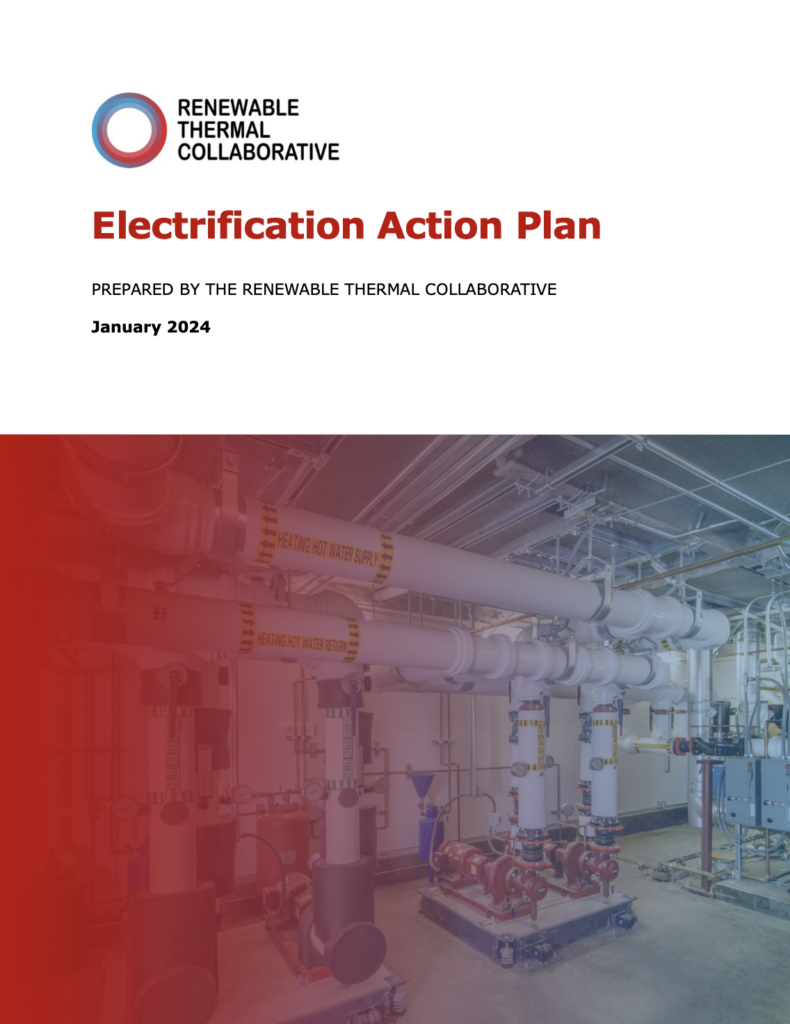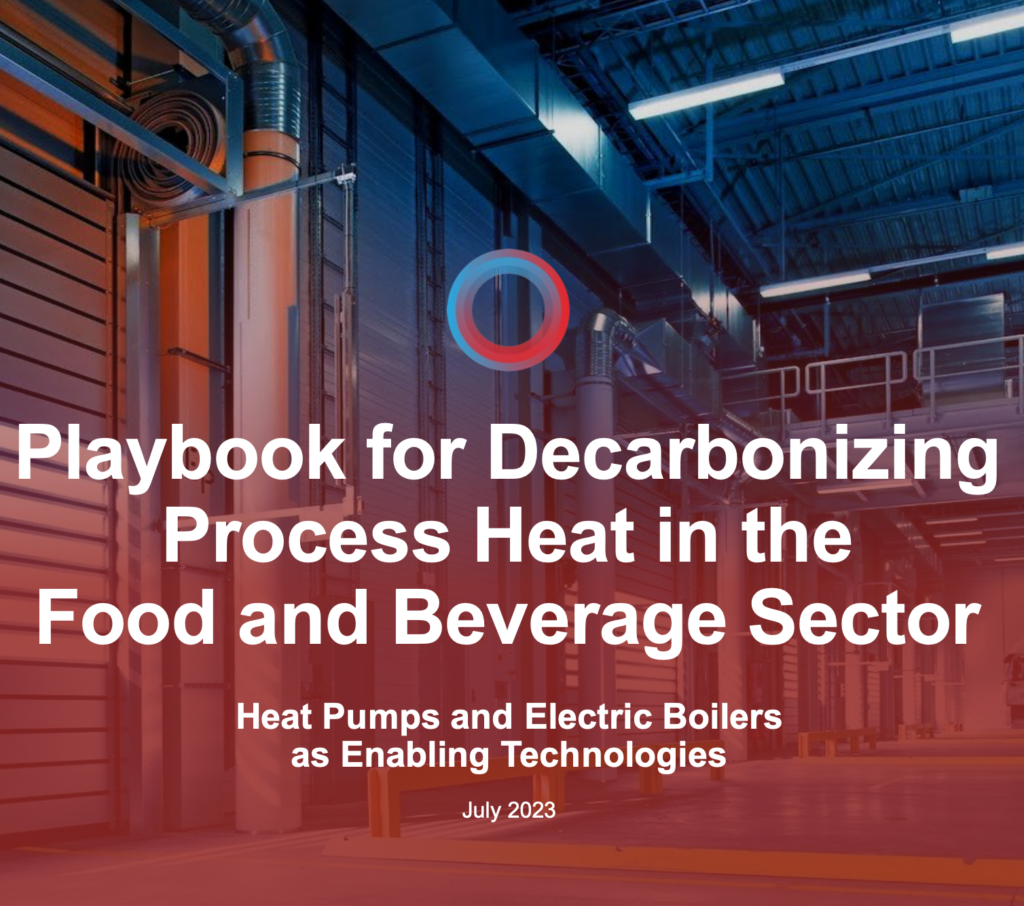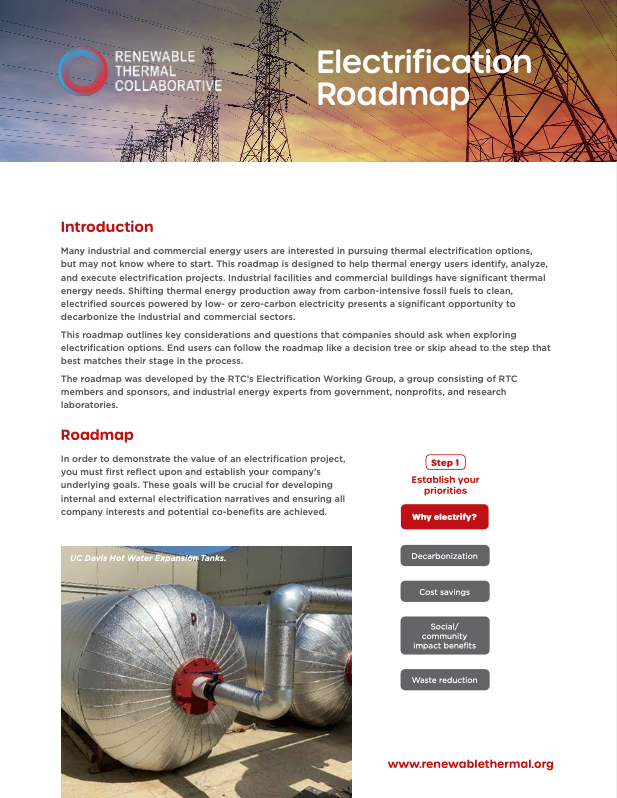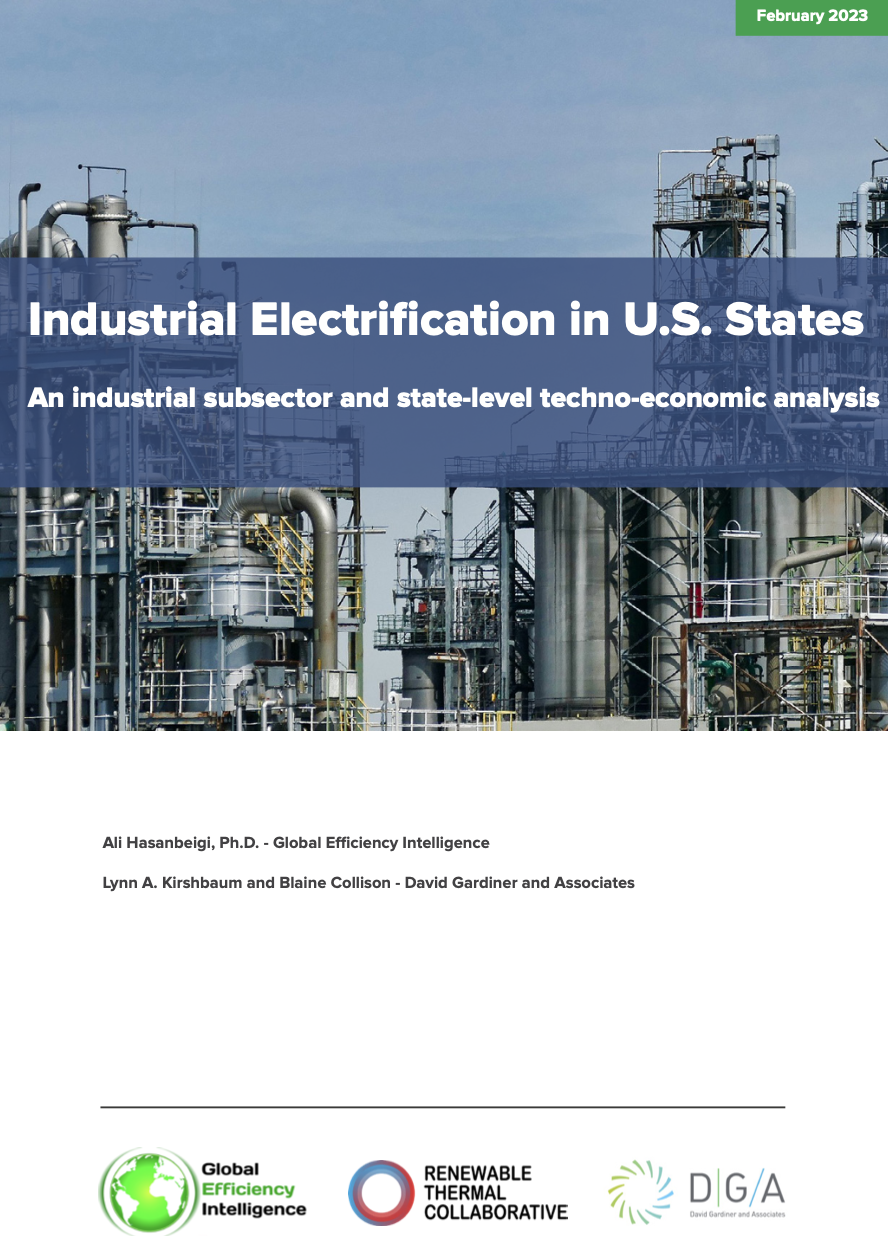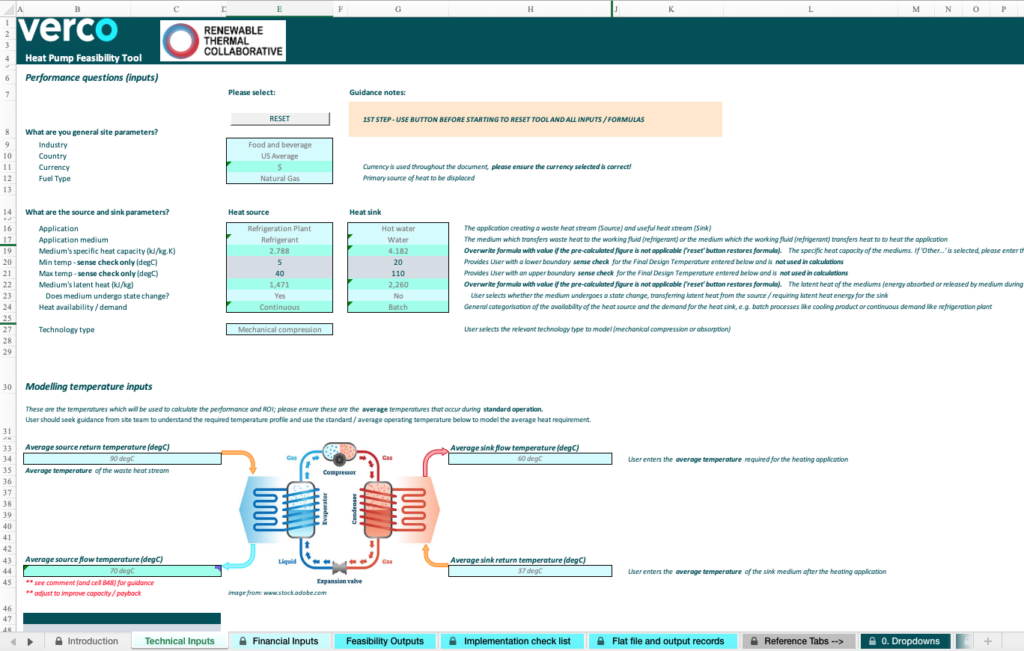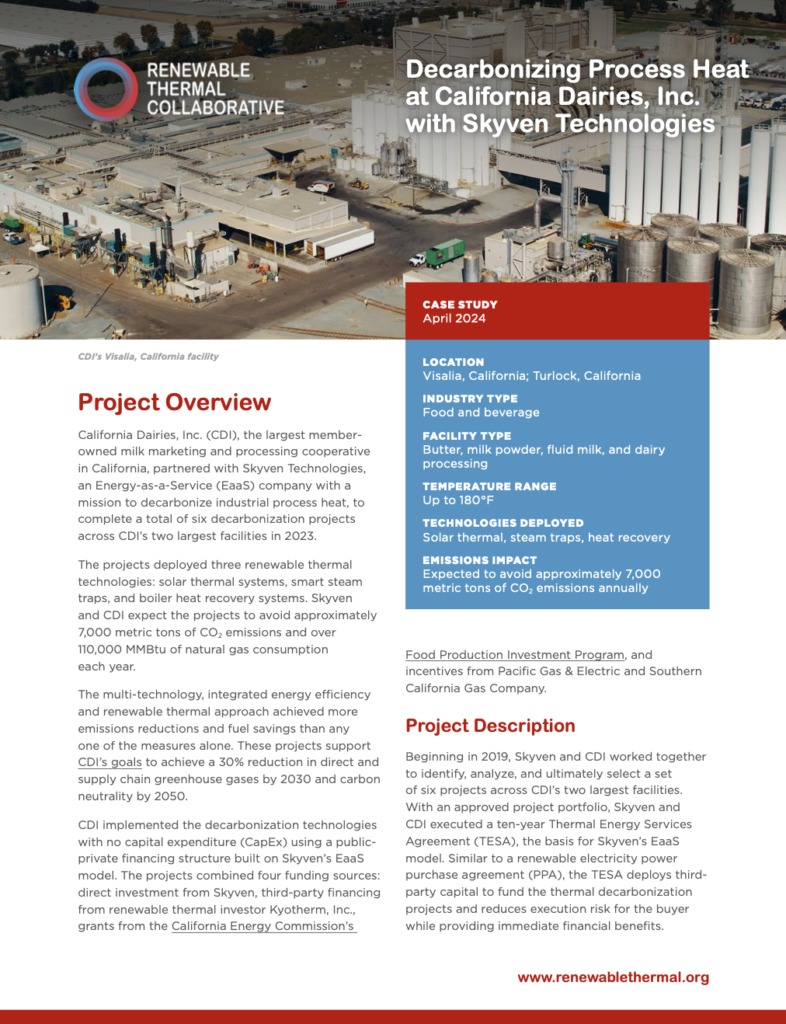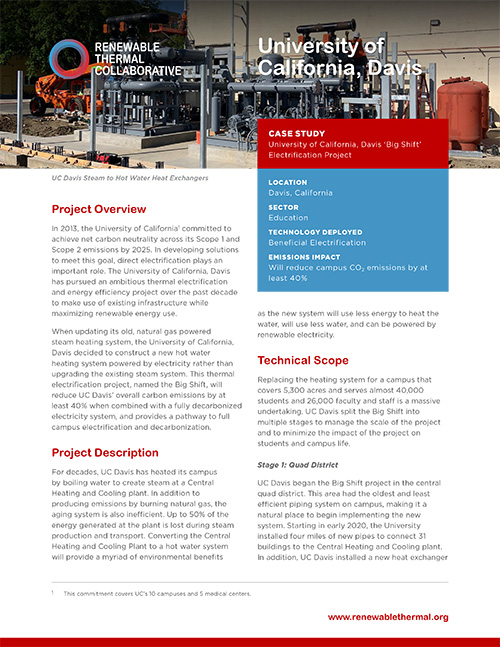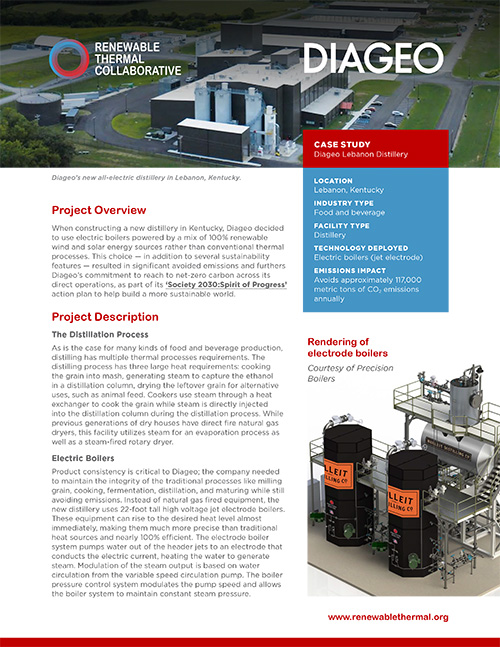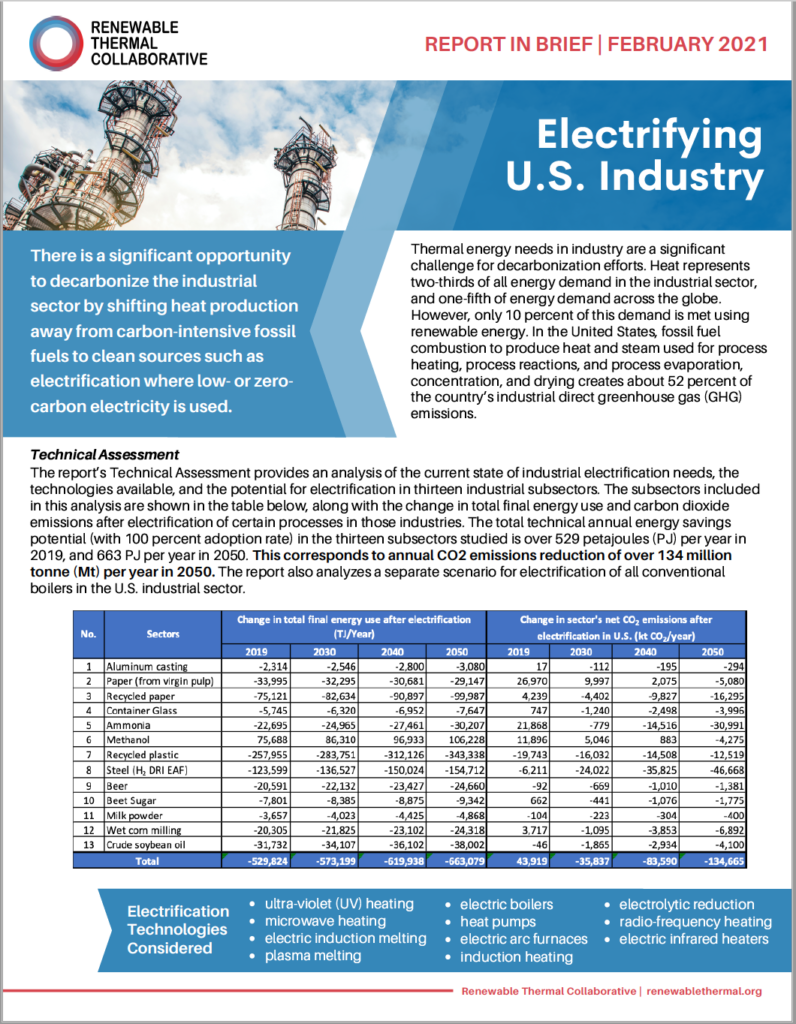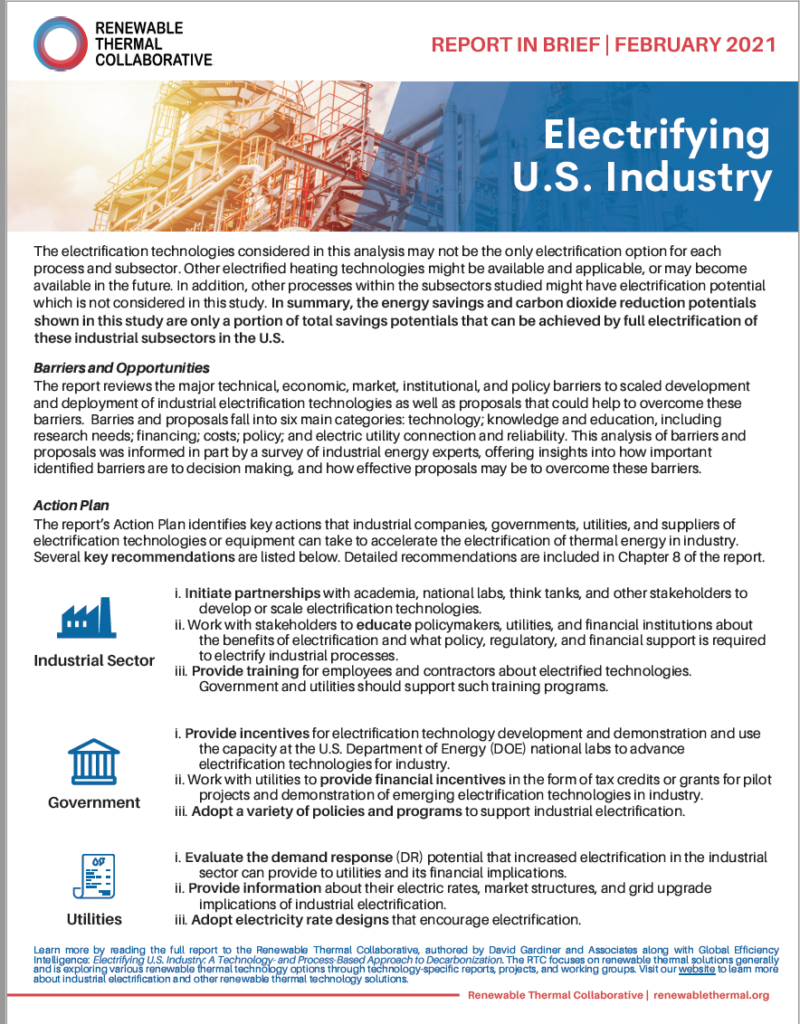Beneficial Electrification
Beneficial electrification refers to replacing the direct use of fossil fuels with low- or zero carbon-electricity to reduce emissions. Electrification can be an effective decarbonization solution for industrial process heat, space heating and cooling, and transportation. In industrial applications, electrification options such as heat pumps and electric boilers can serve many low- and medium-temperature processes, and some electrification technologies such as electric arc furnaces can provide heat to high-temperature processes.
What is the RTC doing?
The RTC Electrification Working Group brings together RTC Members and Solutions Providers, as well as individuals from government, academia, and national laboratories to catalyze increased use of zero- or low-carbon electricity for thermal processes.
The Working Group developed the Electrification Action Plan, an ambitious, multi-year strategy to address barriers to electrification. This group will continue to serve as the main forum for ongoing discussions on the evolving barriers to technology deployment, and for prioritizing and implementing actions. To participate in the Electrification Working Group, join the RTC.
Selected materials and webinars
Electrification Action Plan
Developed in collaboration with the RTC Members and Solutions Providers in the Electrification Working Group, the RTC’s Electrification Action Plan lays out an ambitious, multi-year strategy to address barriers to electrification. It provides a vision for the priority market, policy, and community actions that will drive the RTC towards its goal of a 30% reduction in U.S. industrial thermal emissions by 2030 and full sector decarbonization by 2050. The action plan describes how accelerating electrification will require new federal and state policies as well as tactical tools, trainings, and convenings to support market development.
Playbook for Decarbonizing Process Heat in the Food & Beverage Sector
The low-temperature heat accounts for 97% of the thermal energy use in the U.S. food and beverage sector, making electrification with heat pumps and electric boilers a promising opportunity for cutting emissions in the near-term. To accelerate electrification in this critical sector, the RTC published the Playbook for Decarbonizing Process Heat in the Food and Beverage Sector, co-authored by the World Wildlife Fund (WWF) and Guidehouse. The Playbook outlines the major technology, market, and policy barriers to heat pump and electric boiler adoption in the sector, and lays out concrete, actionable recommendations for energy buyers and other stakeholders looking to deploy these decarbonization technologies.
Webinar Recording
The RTC held a webinar launching the Playbook on August 8, 2023. Click the icon to watch the recording.
Electrification Roadmap
Shifting thermal energy production away from carbon-intensive fossil fuels to clean sources such as electrification where low- or zero-carbon electricity is used presents a significant opportunity to decarbonize the industrial and commercial buildings sectors. Many in the industrial and commercial sectors are interested in pursuing thermal electrification options, but some may not know where to start.
This roadmap is designed to help thermal energy users identify, analyze, and execute electrification projects. It categorizes what companies need to consider and the questions they need to ask while exploring electrification options
Industrial Electrification in U.S. States Report & Factsheets
Created by Global Efficiency Intelligence and David Gardiner & Associates, this report to the RTC analyzes a handful of industries and the impact electrification would have on their energy use, emissions, and energy costs. Because industrial facilities, policy, and renewable energy resources vary across geographies, this study takes a state-by-state approach, describing the impacts and benefits of electrification in 20 different jurisdictions. The report makes six recommendations for policymakers looking to electrify their state’s industrial heat use: supporting emerging technologies, using financial incentives, increasing renewable electricity generation, enhancing the grid, engaging communities, and growing the workforce.
Because industrial facilities, policy, and renewable energy resources vary across geographies, this study takes a state-by-state approach, zeroing in on 20 states with large industrial sectors. Factsheets for each state were published alongside the report, outlining which sectors can reduce emissions the most through electrification, the technologies available for those sectors, and the geographic distribution of emissions by sector. Each factsheet also identifies key actions policymakers and other stakeholders can take to electrify industry in the state.
Heat Pump Decision Support Tools
Industrial heat pumps transfer ambient or waste heat from a lower-temperature source to a higher-temperature application, enabling users to efficiently heat processes and eliminate pollution from fossil fuel combustion across a range of geographies and industrial applications. However, many engineers lack the time and resources to undertake the preliminary studies necessary for implementation. The RTC, along with energy specialists Verco, has developed a suite of three Heat Pump Decision Support Tools to assist with these studies. The tools aim to accelerate heat pump deployment by bridging the gap between those planning to reduce emissions across multiple sites and technical engineering teams on the ground.
Webinar Recording
The RTC hosted a webinar featuring a guided tour of the tools from Verco and presentations from Procter & Gamble and Roche. Click the icon to watch the recording.
Case Study: Decarbonizing Process Heat at California Dairies, Inc. with Skyven Technologies
Explore how California Dairies, Inc. (CDI), the largest member-owned dairy cooperative in California, partnered with RTC Solutions Provider Skyven Technologies to decarbonize industrial process heat across two major facilities. This case study details the project’s integrated approach to deploying solar thermal technology, smart steam traps, and heat recovery systems expected to avoid a total of 7,000 metric tons of CO2 emissions annually. It explains how CDI implemented the renewable thermal projects with no capital expenditure by utilizing Skyven’s innovative Energy-as-a-Service model and combining direct investment, third-party financing, utility incentives, and state grants. The case study highlights the substantial emissions reductions and cost savings achieved as well as key lessons learned.
Webinar Recording
The RTC hosted a webinar diving deeper into this project, featuring Skyven Technologies' Chris Barnhill. Click the icon to watch the recording.
Case Study: University of California, Davis ‘Big Shift’ Electrification Project
The University of California, Davis constructed a new hot water heating system powered by electricity to replace old, natural gas-powered steam equipment. The project, named the Big Shift, will reduce UC Davis’ overall carbon emissions by at least 40% and enable the University to achieve Scope 1 and Scope 2 decarbonization by 2025.
To download the full report and understand the lessons UC Davis learned in this project, fill out the form below.
Case Study: Diageo Lebanon Distillery
When constructing a new distillery in Kentucky, Diageo decided to use electric boilers powered by a mix of 100% renewable wind and solar energy sources rather than conventional thermal processes. This choice — in addition to several sustainability features — resulted in significant avoided emissions and furthers Diageo’s commitment to reach to net-zero carbon across its direct operations, as part of its ‘Society 2030:Spirit of Progress’ action plan to help build a more sustainable world.
Webinar: Electrifying 6,000 Buildings Using Innovative Financing: Ithaca, NY’s Plan
The City of Ithaca, NY has announced an ambitious plan to electrify 6,000 existing residential and
commercial buildings by 2030. Part of the City’s Green New Deal, Ithaca is partnering with two unique
firms – RTC Solutions Provider Alturus and BlocPower – to fund the entire effort.
Luis Aguirre-Torres, Director of Sustainability for the City of Ithaca, and Charlie Daum, Managing irector, Alturus, discussed how they’ve structured a replicable model to deploy energy efficiency, generation and other projects across a large portfolio of aging commercial buildings, while quickly accessing significant capital that will support rapid engagement and deployment. Lynn A. Kirshbaum of David Gardiner and Associates moderated this informative webinar.

Electrifying U.S. Industry
On January 27, 2021, Global Efficiency Intelligence and David Gardiner and Associates (DGA) released Electrifying U.S. Industry: A Technology and Process-Based Approach to Decarbonization, a new report to the Renewable Thermal Collaborative. The report finds that there is a significant opportunity to decarbonize the industrial sector by shifting heat production away from carbon-intensive fossil fuels to clean sources such as electrification where low- or zero-carbon electricity is used.
The report reviews the major technical, economic, market, institutional, and policy barriers to scaled development and deployment of industrial electrification technologies, as well as proposals that could help to overcome these barriers. Categories of barriers and proposals include technology, knowledge and education, financing, costs, policy, and electric utility connection and reliability.
The report’s Action Plan describes actions and policy recommendations that can be taken by industry and others to scale up industrial electrification, given the state of the market and the institutional and policy environment described in the Technical Assessment.
Report In Brief
In our fact sheet, we provide an overview of the major technical, economic, market, institutional, and policy barriers to scaled development and deployment of industrial electrification technologies, as well as proposals that could help to overcome these barriers. The fact sheet also describes actions and policy recommendations that can be taken by industry and others to scale up industrial electrification, given the state of the market and the institutional and policy environment described in the Technical Assessment.
On January 27, 2021 from 12:00-1:00pm EST, the Renewable Thermal Collaborative introduced a report titled, Electrifying U.S. Industry: A Technology and Process-Based Approach to Decarbonization.
Authors Dr. Ali Hasanbeigi and Lynn A. Kirshbaum shared the analysis and the implications and next steps for industrial energy users, policymakers, and others.
Speakers Included:
- Moderator: Blaine Collison, Executive Director, Renewable Thermal Collaborative
- Steve Skarda, Global Energy Sustainability Leader, Procter & Gamble
- Ali Hasanbeigi, PhD, Founder and CEO, Global Efficiency Intelligence, LLC
- Lynn A. Kirshbaum, Senior Associate, David Gardiner and Associates

How to get involved:
The RTC develops our work streams in collaboration with our Members and Solutions Providers. To join us in driving renewable thermal technologies forward, become a Member or Solutions Provider of the RTC. Existing Members and Solutions Providers may join this workstream at any point.
Find providers offering electrification solutions:
Contact:
Ruth Checknoff, RTC Projects and Research Director: ruth@dgardiner.com

